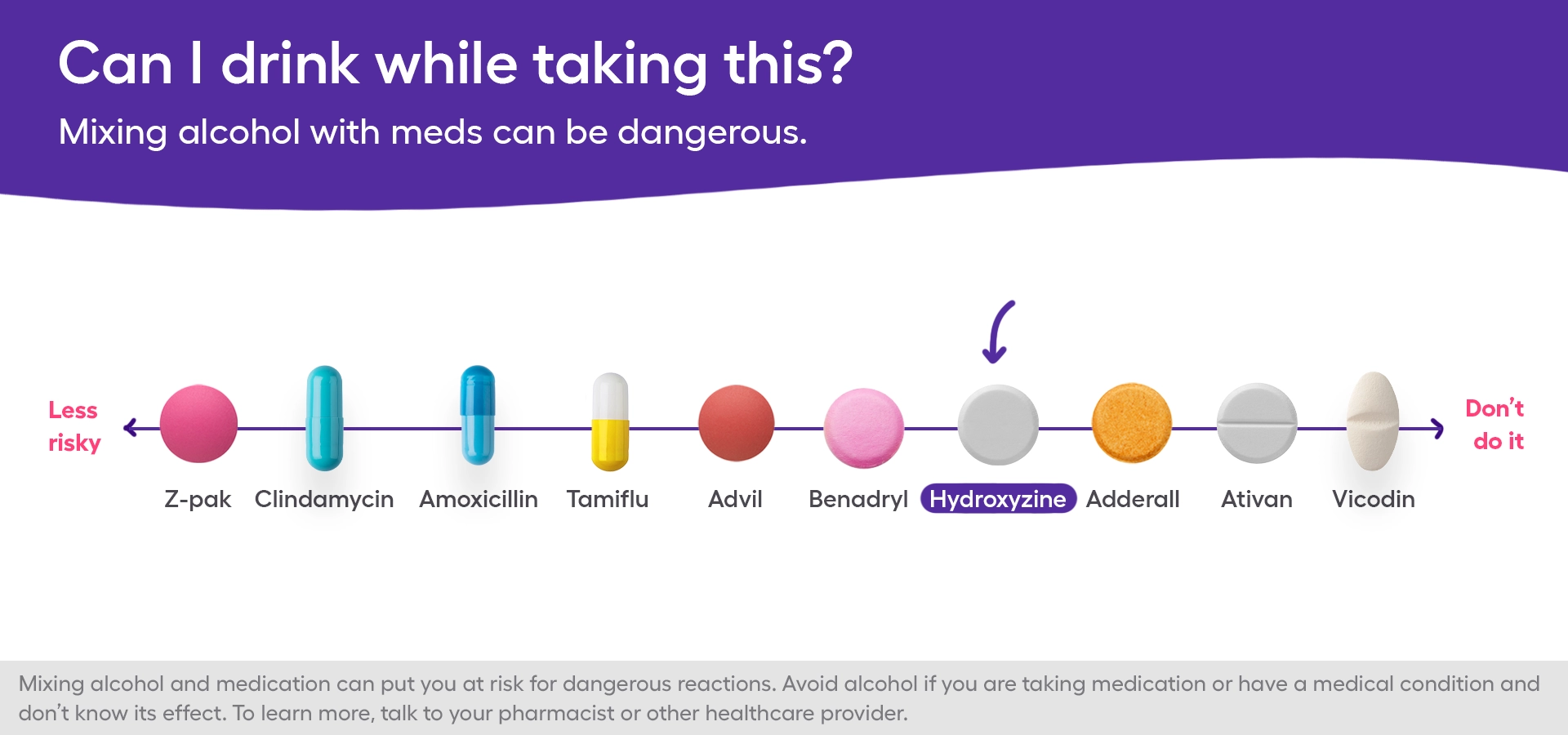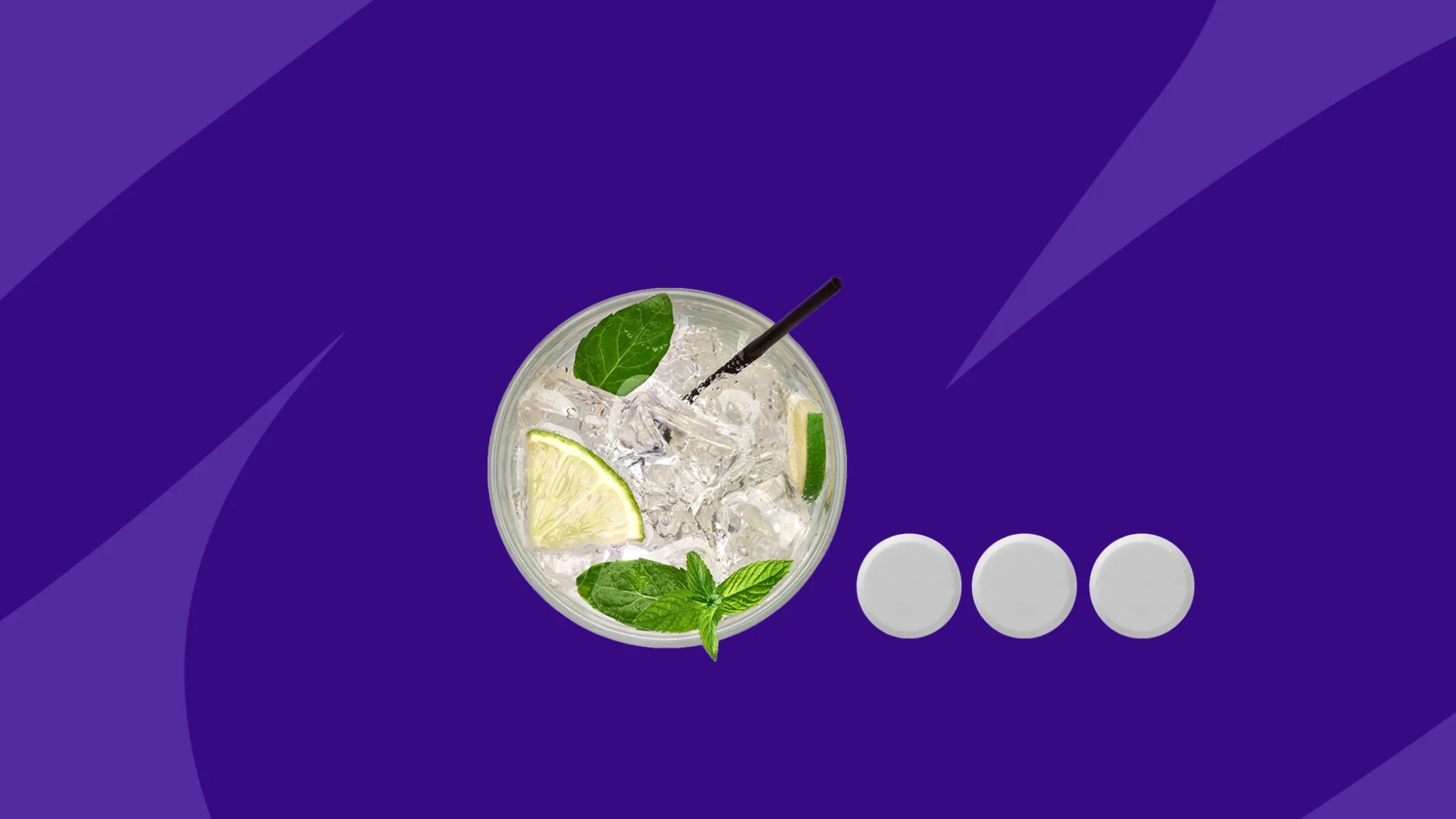Key takeaways
Hydroxyzine is a prescription antihistamine typically used for allergies and anxiety.
Drinking alcohol while taking hydroxyzine can lead to increased sedation, drowsiness, and dizziness. The FDA label of the medication advises avoiding alcohol consumption altogether.
You should wait at least two to three days after the last dose of hydroxyzine before consuming alcohol.
Hydroxyzine is an antihistamine prescribed to manage itching caused by allergic reactions, reduce anxiety, or induce sedation before or after a medical procedure. In some cases, it may even be used to treat alcohol withdrawal symptoms, such as anxiety and insomnia. It works by blocking histamine and affecting other chemicals, like serotonin and dopamine, in the brain.
If you’re taking this medication, you might be wondering whether it’s safe to have a drink with friends. Combining hydroxyzine and alcohol may result in worsened side effects, leading to increased sedation, drowsiness, or dizziness—though the severity may vary from person to person. Keep reading to learn more about mixing this prescription with alcohol.
Can you drink on hydroxyzine?
Although hydroxyzine is sometimes prescribed for alcohol withdrawal symptoms, it’s not recommended to mix hydroxyzine and alcohol. Hydroxyzine has the potential to cause several side effects that slow down the central nervous system (CNS). Adding alcohol into the mix can increase these effects. Therefore, the FDA label and healthcare professionals advise that you avoid alcohol consumption altogether while on this medication.
Even a single glass of wine may increase the medication’s sedative properties. As a result, driving or operating machinery could become particularly dangerous. It’s generally safer to avoid alcohol use during treatment with hydroxyzine. Even occasional alcohol use, whether it’s just one or a couple of drinks, could potentially worsen the side effects of hydroxyzine on the body.
If you choose to drink on hydroxyzine, you’ll want to be aware of these increased risks and the chance that alcohol abuse could lead to more serious health implications. If there are any doubts or questions, it’s always best to consult a healthcare provider.
What happens if you drink alcohol with hydroxyzine?
Drinking alcohol while taking hydroxyzine can increase central nervous system side effects, such as drowsiness, dizziness, and sedation. Taking hydroxyzine alone can cause these side effects, so combining the medication with alcohol can compound these effects.
Hydroxyzine can react quickly with alcohol after ingestion. This interaction can lead to impaired motor skills and judgment, which might last for several hours until the substances have left the bloodstream. Patients often notice hydroxyzine working within 15 to 30 minutes for allergy and anxiety symptoms, but when combined with alcohol, the usual signs of relief may become less apparent.
Common side effects of mixing hydroxyzine with alcohol include:
- Sleepiness
- Dizziness
- Decreased coordination
- Slowed reaction times
- Difficulty concentrating
- Headache
More serious side effects can be life-threatening and require immediate medical attention. See a healthcare provider if you experience any of the following symptoms:
- Trouble breathing
- Unexpected heart problems
- Extreme drowsiness
- Seizures
- Hallucinations
- High levels of confusion or impairment
Remember, hydroxyzine can interact with other medications as well, particularly those that also affect the central nervous system, such as benzodiazepines and opioids. Consult a healthcare provider before mixing medicines with alcohol.
Are certain people at greater risk of side effects?
Some people may be at a greater risk of severe side effects from hydroxyzine, especially when mixing it with alcohol. Certain situations warrant the need for extreme caution and, ultimately, avoiding mixing even a small amount of alcohol and hydroxyzine.
Older adults
The body’s liver and kidney functions, among others, tend to decline with age. As hydroxyzine is metabolized or processed by the liver and kidneys, older people may not be able to break down the medication as effectively as younger individuals. Therefore, they may be at a higher risk of side effects with hydroxyzine. Adding alcohol to this situation could amplify this risk.
People with heart conditions
Individuals with heart conditions, particularly those affecting heart rhythm or heart rate, should avoid mixing hydroxyzine with alcohol. Hydroxyzine can affect heart rhythm, increasing the risk of a heart rhythm disorder called long QT syndrome. There have also been reports of people experiencing QT prolongation after alcohol use, especially heavy alcohol consumption. Therefore, alcohol may worsen the risk of this complication of hydroxyzine.
Individuals with liver problems
The liver metabolizes both hydroxyzine and alcohol. Individuals who drink heavily may be at risk of liver problems, including liver disease and liver failure. Those who drink heavily and have liver problems may not be able to process hydroxyzine well, which could increase the side effects of hydroxyzine. Hydroxyzine has not been associated with liver injury on its own, however.
People taking other CNS depressants
In rare cases, a healthcare provider may prescribe other medications that act as CNS depressants alongside hydroxyzine. Taking other CNS depressants, such as benzodiazepines or sedative-hypnotics, with hydroxyzine can lead to severe sedation and even respiratory depression. Adding alcohol to the mix can intensify these effects, making it particularly risky for those on multiple medications for health conditions.
If you fall under any of these categories, you’ll likely want to skip alcoholic beverages while taking hydroxyzine. Even if you’re not drinking alcohol, you may need to avoid hydroxyzine under these conditions or consult a healthcare provider to adjust your treatment.
How long after taking hydroxyzine can I drink alcohol?
The effects of hydroxyzine typically wear off around six hours. However, just because the effects wear off doesn’t mean you’re in the clear. Instead, you’ll want to take note of the medication’s half-life.
Hydroxyzine half-life
The half-life of hydroxyzine is approximately 20 hours. This means it takes around 20 hours for half of the drug to be eliminated from your system. The exact half-life can vary depending on liver function and how fast you metabolize medications.
It’s generally advised to wait at least 48 hours after your last dose of hydroxyzine before consuming alcohol. Still, it’s safer to wait closer to three days, especially if you are taking a higher dose, as this may help reduce the risk of adverse interactions.
You may want to wait even longer if you’ve been taking hydroxyzine long-term, especially if you were prescribed a relatively high dosage. For example, the typical dosage in adults for anxiety is 50 to 100 mg four times daily. If you’ve been prescribed hydroxyzine for alcohol withdrawal or anxiety linked to detox, you’ll likely be avoiding alcohol at all costs. Combining it with alcohol can significantly slow recovery and may pose health risks.
It’s recommended to consult with a healthcare professional before mixing alcohol with any medication, including hydroxyzine. They can offer medical advice based on your health status and other medications you may be taking.
Which anxiety medications are not affected by alcohol?
It’s generally not recommended to take any anxiety medications with alcohol. That’s because many anxiety medications work in similar ways to slow the CNS. As a result, many of them share similar side effects of drowsiness, dizziness, and impaired coordination.
It’s important to consult a healthcare provider about drinking alcohol with your medications, as individual responses can vary. That said, some medications may be less likely to interact with alcohol than others.
Selective serotonin reuptake inhibitors (SSRIs), such as Lexapro (escitalopram) and Celexa (citalopram), and serotonin-noradrenaline reuptake inhibitors (SNRIs), such as Pristiq (desvenlafaxine) and Cymbalta (duloxetine), may be less likely to cause drowsiness than benzodiazepines like Xanax (alprazolam) and Klonopin (clonazepam).
This doesn’t mean SSRIs and SNRIs can be taken with alcohol without any risk. Drinking alcohol while on these antidepressants may lead to amplified side effects, like headaches and dizziness. However, they don’t generally cause the same level of CNS depression as other anti-anxiety medications, thereby reducing the risk of severe side effects with alcohol. Other anti-anxiety medications that may cause severe drowsiness, especially in combination with alcohol, include barbiturates, such as Luminal (phenobarbital) and Seconal (secobarbital).
Talk to your healthcare provider about the effects of taking alcohol with your medications. You’ll also want to tell your healthcare provider about other medications you’re taking, including prescription drugs, over-the-counter medicines, and herbal supplements, especially if you’re considering drinking alcohol.
The bottom line: Alcohol and hydroxyzine don’t mix
Mixing hydroxyzine with alcohol can significantly increase the likelihood of drowsiness and impaired coordination due to their combined effect on slowing down the central nervous system. It’s advisable to avoid alcohol for at least two to three days after taking a dose of hydroxyzine. The risk is particularly higher in older individuals and those with liver issues. Always seek medical advice before consuming alcohol if you’re using hydroxyzine.
Sources
- Vistaril highlights of prescribing information, U.S. Food and Drug Administration (2016)
- Hydroxyzine, MedlinePlus (2017)
- Relation of heavy alcohol consumption to QTc interval prolongation, The American Journal of Cardiology (2016)
- Hydroxyzine, LiverTox (2017)
- Hydroxyzine, ScienceDirect (2024)
- Efficacy and safety of hydroxyzine for sleep in adults: Systematic review, Human Psychopharmacology: Clinical and Experimental (2023)
- A single-center, randomized, double-blind, placebo-controlled, crossover investigation of the effects of fexofenadine hydrochloride 180 mg alone and with alcohol, with hydroxyzine hydrochloride 50 mg as a positive internal control, on aspects of cognitive and psychomotor function related to driving a car, Clinical Therapeutics (2003)











